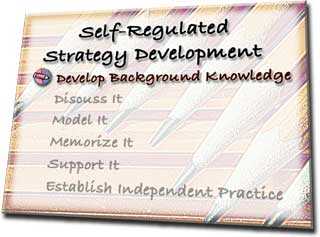What procedures might Ms. Lin suggest?
Page 4: Develop Background Knowledge
 Mr. Carter wants to teach a writing strategy to help his students to more consistently complete their written assignments. He follows Ms. Lin’s recommendation and introduces the first instructional stage of the Self-Regulated Strategy Development Model—develop background knowledge. Doing so, Mr. Carter will:
Mr. Carter wants to teach a writing strategy to help his students to more consistently complete their written assignments. He follows Ms. Lin’s recommendation and introduces the first instructional stage of the Self-Regulated Strategy Development Model—develop background knowledge. Doing so, Mr. Carter will:
- Identify the skills students will need to use a particular strategy
- Assess whether his students possess these skills
- Help students develop the necessary skills (e.g., vocabulary) they may need to learn the academic and self-regulation strategy
Students’ pre-existing skills can be assessed in a number of ways, the simplest of which is for a teacher to ask his or her students to perform a task and observe what they can and cannot do. Teachers can also ask their students directly about what aspects of a task are the most difficult or whether there are some steps they are unable to carry out. Another good way to determine what skills students may need in order to implement a strategy is to perform a task analysis, which involves breaking down all of the steps needed to complete the strategy. Click here for an example of a task analysis. If Mr. Carter finds that his students lack the skills necessary to implement his writing strategy then he can begin to teach those specific skills.
Task Analysis for Writing a Complete Sentence
- Think of an idea or topic you want to write about.
- Make sure your sentence includes both subjects and verbs.
- Use a capital letter in the first word of the sentence.
- Arrange the words in order so that they make sense.
- Ask yourself whether the sentence makes a complete thought.
- End the sentence with a period or other end punctuation (e.g., a question mark).
In addition to developing their students’ background knowledge, teachers can introduce self-regulation strategies. Having assessed his students’ needs, Mr. Carter will begin with goal setting and self-monitoring. Listen below to Karen Harris talk about these two strategies.

Karen Harris, PhD
Division of Educational Leadership and Innovation
Arizona State University, Tempe, Arizona
Transcript: Karen Harris, PhD
Goal Setting
First, in order to set a goal, the student has to understand the task they’re being asked to do. If it’s an opinion essay, I need to understand that a good opinion essay has an opening statement, has at least three reasons that are persuasive and believable, and has a good ending. Therefore, I can goal-set for each of those components. My problem-solving plan is to have each of those pieces. We can set goals not just for the elements of that writing genre, we can set goals for the influence we want to have on the reader. We can set goals for what the finished product will look like. We can talk about having goals for multiple paragraphs, and so forth. These can all be individualized to the student. When the students set their goals for their written product, they are, in fact, laying out a work plan, a road map.
Transcript: Karen Harris, PhD
Self-monitoring
Many of our students start out with good intention, but they quit. They’ll start into writing or math or reading, and the task is difficult, the task is frustrating. They don’t have the capability to deal with that affect. An important part of self-monitoring is not just, “Do I have all the pieces?” but “How am I reacting to this? Am I getting frustrated, am I getting upset, do I want to quit?” So we self-monitor our affect. We self-monitor our approach to the task. We also do self-monitor the components. First, my goal is to write an opening statement. I’ll get something down. Now I will evaluate. Self-monitoring doesn’t just mean checking off if it’s done. Self-monitoring means evaluating. Is it clear? Have I stated what I believe? Have I caught the reader’s interest in some way? Now I’ll move to my next goal. I need at least three reasons. Let me brainstorm my reasons, and so forth and so on.
View the movie below to see a teacher implementing an initial step in the SRSD approach, developing background knowledge (time: 1:25).
Transcript: Develop Background Knowledge
Teacher: Who can tell me what makes a good story? Will?
Will: Well, if it has a great action scene in the very middle of it.
Teacher: A great action scene. Good.
Student: A hook that could, like, get you into the book before you quit it.
Teacher: So you have kind of the reader that wants to be sucked into the story and be aware. Very good. Any other ideas on what makes a good story? Stuart?
Stuart: Make the story kind of make sense.
Teacher: The story needs to make sense. Have you ever read a story that you just read it and you said, “What was that about? I have no idea. It made no sense at all!” You want a story to make sense. Very good. Do stories have to be true?
Class: No.
Teacher: No. What kind of stories can you have? Sarah?
Sarah: Fantasy.
Teacher: Huh?
Sarah: Fantasy stories.
Teacher: Fantasy stories. Victor?
Victor: Fiction.
Teacher: Fiction. Ellie?
Ellie: Biography.
Teacher: Biography. Elias?
Elias: Um, Greek mythology.
Teacher: Greek mythology. Cameron?
Cameron: Maybe a novel?
Teacher: A novel. So, yeah, you have all different kinds of stories, and we want stories to have all their parts and make sense. We want them to be fun to read. We want to be able to hook our readers, and they need to have all their parts.